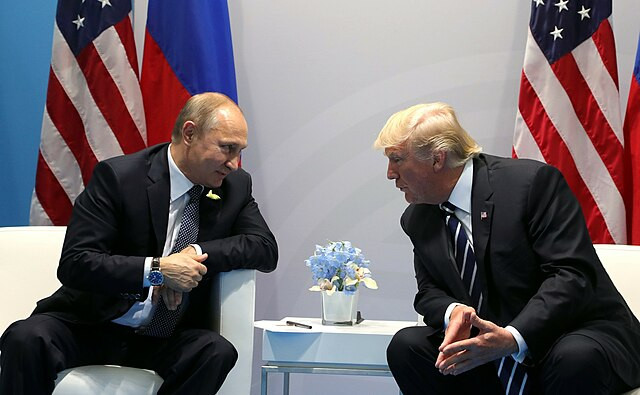Russian President Vladimir Putin prayed for Donald Trump after the former U.S. president survived an assassination attempt last year, and later commissioned a personal portrait as a gift, according to Trump's chief negotiator Steve Witkoff. The revelation comes as Trump and Putin engaged in direct talks this week on a partial ceasefire in Ukraine.
Witkoff disclosed the details of his conversations with Putin during an appearance Friday on former Fox News host Tucker Carlson's podcast. He recounted how, during his second visit to Moscow, Putin described going to church to pray after Trump was shot during a campaign rally in Pennsylvania last July.
"When the president was shot, he went to his local church and met with his priest and prayed for the president," Witkoff said. "Not because he was the president of the United [States]... but because he had a friendship with him, and he was praying for his friend."
Trump, who was then the Republican Party's presumptive nominee, was grazed by a bullet fired by 20-year-old Thomas Matthew Crooks while addressing supporters in Butler, Pennsylvania. The incident left Trump with a minor ear injury, but raised broader concerns about political violence.
Witkoff added that Putin had also commissioned "a beautiful portrait" of Trump from a leading Russian artist. "President Putin had commissioned a beautiful portrait of President Trump... and actually gave it to me and asked me to take it home to President Trump," Witkoff said, noting that Trump was "clearly touched" by the gesture.
The disclosure reinforces long-standing scrutiny over Trump's favorable stance toward Putin. Throughout his presidency, Trump repeatedly praised the Russian leader as a "strong leader" and "genius," drawing criticism from both political opponents and foreign policy experts who argue he has been overly accommodating to the Kremlin.
The comments from Witkoff surfaced as Trump and Putin held a two-hour phone call this week focused on ending the ongoing war between Russia and Ukraine. According to a White House readout, the two leaders agreed to a 30-day partial ceasefire covering energy infrastructure and technical discussions on Black Sea maritime security, with immediate talks on a broader peace framework to follow.
"The leaders agreed that the movement to peace will begin with an energy and infrastructure ceasefire, as well as technical negotiations on implementation of a maritime ceasefire in the Black Sea, full ceasefire and permanent peace," the White House statement said.
Witkoff highlighted one of the primary sticking points in negotiations: control over Russian-occupied regions in Ukraine, including Crimea, Donetsk, Luhansk, Kherson, and Zaporizhia. He noted that these territories are predominantly Russian-speaking and referred to Russian-conducted referendums showing strong support for annexation, though these votes are widely dismissed by Western nations as illegitimate.
"The Russians have de facto control over those territories," Witkoff stated. "The question is, will the world recognize that these are Russian territories? Will Zelensky survive politically if he does? That's the central issue of the conflict."
Fighting on the ground, however, showed no signs of easing. Ukrainian authorities reported that three civilians were killed and 12 wounded in a Russian drone attack on Zaporizhzhia early Saturday. Ivan Fedorov, head of the Zaporizhzhia regional administration, confirmed that residential buildings and infrastructure were set ablaze during the assault.
The Ukrainian air force stated that Russia launched 179 drones and decoys overnight, of which 100 were intercepted. An additional 63 were "lost," likely neutralized through electronic jamming systems. Fires were reported in Kyiv and Dnipropetrovsk as debris from intercepted drones fell.
Ukrainian President Volodymyr Zelensky publicly signaled openness to Trump's proposed ceasefire framework, stating: "We will not be against any format, any steps toward unconditional ceasefire."




